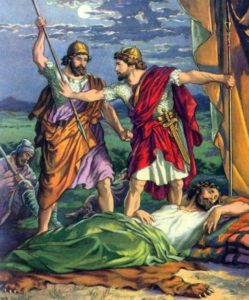 The Ziphites once again report David’s whereabouts to King Saul (1 Samuel 23:19; 26:1). King Saul takes his 3000 men to the wilderness of Ziph. He camps out on the hill of Hachilah, where David is reportedly staying. Saul surrounds himself with his troops and falls asleep. “A sound sleep from the Lord” falls upon them. David and Abishai courageously invade Saul’s encampment while they are sleeping. They find Saul fast asleep with his spear stuck in the ground next to his head. Abishai recognizes that this would be the ideal opportunity to kill Saul, saying to David, “Today God has delivered your enemy into your hand.” He asks permission from David to be able to kill Saul with one simple stroke to the head with Saul’s own spear.
The Ziphites once again report David’s whereabouts to King Saul (1 Samuel 23:19; 26:1). King Saul takes his 3000 men to the wilderness of Ziph. He camps out on the hill of Hachilah, where David is reportedly staying. Saul surrounds himself with his troops and falls asleep. “A sound sleep from the Lord” falls upon them. David and Abishai courageously invade Saul’s encampment while they are sleeping. They find Saul fast asleep with his spear stuck in the ground next to his head. Abishai recognizes that this would be the ideal opportunity to kill Saul, saying to David, “Today God has delivered your enemy into your hand.” He asks permission from David to be able to kill Saul with one simple stroke to the head with Saul’s own spear.
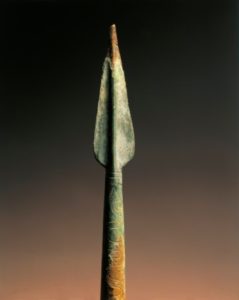 1 Samuel 26:9-11 (NIV) 9 But David said to Abishai, “Don’t destroy him! Who can lay a hand on the LORD’s anointed and be guiltless? 10 As surely as the LORD lives,” he said, “the LORD himself will strike him; either his time will come and he will die, or he will go into battle and perish. 11 But the LORD forbid that I should lay a hand on the LORD’s anointed. Now get the spear and water jug that are near his head, and let’s go.”
1 Samuel 26:9-11 (NIV) 9 But David said to Abishai, “Don’t destroy him! Who can lay a hand on the LORD’s anointed and be guiltless? 10 As surely as the LORD lives,” he said, “the LORD himself will strike him; either his time will come and he will die, or he will go into battle and perish. 11 But the LORD forbid that I should lay a hand on the LORD’s anointed. Now get the spear and water jug that are near his head, and let’s go.”
Once again, David leaves room for the Lord to deal with his enemies. He gives evidence of his presence and his mercy by taking Saul’s spear and the jug of water. We see that David is committing his way to the Lord.
Psalm 37:5 5 Commit your way to the LORD, trust also in Him, and He will do it.
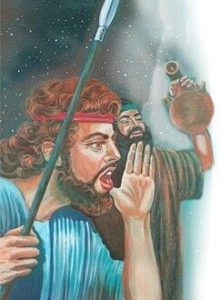 David respected the authority of Saul’s office as king. He also respected that the Lord was sovereign and in charge of the timing of when Saul would be deposed from his office.
David respected the authority of Saul’s office as king. He also respected that the Lord was sovereign and in charge of the timing of when Saul would be deposed from his office.
David reprimands Saul’s officer, Abner, for being negligent in his duty to guard the King and his belongings. Saul recognizes David’s voice and has a moment of spiritual enlightenment, saying, “I have sinned. Behold I have played the fool and have committed a serious error” (1 Sam 26:21).
Saul’s assessment of his life is sadly true. He has played the fool. God gave him an opportunity and resources to succeed. He had been given the Spirit of the Lord, the friendship of Samuel, the soul-soothing musician service of David. He had been given a valiant son in Jonathan and daughter in Michal. Yet, he received the grace of God in vain. He was not faithful to use these gifts. He leaned on his own understanding and failed to obey the Lord.
We hear David’s heart to lean on the Lord as he longs to be attached to the inheritance of the Lord and to be worshiping the Lord in His presence (1 Sam 26:19-20).
Saul acknowledges God’s hand on David.
1 Samuel 26:25 (NIV) 25 Then Saul said to David, “May you be blessed, my son David; you will do great things and surely triumph.” So, David went on his way, and Saul returned home.
 1 SAMUEL 27 David acts in fear. David talks to himself in his heart instead of talking to the Lord. He speaks lies to himself. “Now I shall perish one day by the hand of Saul. There is nothing better for me than that I should escape to the land of the Philistines.”
1 SAMUEL 27 David acts in fear. David talks to himself in his heart instead of talking to the Lord. He speaks lies to himself. “Now I shall perish one day by the hand of Saul. There is nothing better for me than that I should escape to the land of the Philistines.”
Do we tell ourselves lies? Sadly, David makes a series of poor decisions as he imagines the future of being hunted once again by King Saul. He rationalizes moving into the enemy’s camp, serving the Philistine king Achish, the king of Gath. Achish gives David the city of Ziklag. David lives in the enemy’s territory for one year and four months. Achish assumes that David will be his servant forever, since David is in such disfavor with King Saul. Achish asks David to join him in battle against Israel.
You might ask how did it happen that David ended up in the enemy’s camp, siding with the enemy as they attacked God’s covenant people? It is a great warning of how quickly we can be deceived.
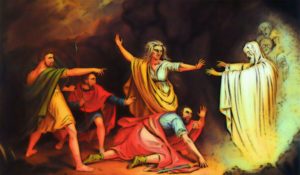 King Saul is desperate. He has no communion with God. He has no prophet or priest to consult, so he disguises himself to receive counsel from a medium, even though he himself had banned all mediums and spiritists from operation in the promised land. He asks the witch at Endor to call up the spirit of Samuel. Such sorcery and witchcraft are forbidden by God and condemned by Saul’s own decree. The medium at Endor who was accustomed to trafficking with demonic spirits and impersonating the deceased, is shocked when Samuel appears by the working of God’s power. She cries out with a loud voice, recognizing the very real presence of Samuel and King Saul. Samuel repeats the message that he gave to Saul earlier, that he had torn the kingdom our of Saul’s hand and given it to David. Samuel also proclaims that the Philistines would defeat his troops the next day in battle and that Saul and his son would die and be joining Samuel in the afterlife.
King Saul is desperate. He has no communion with God. He has no prophet or priest to consult, so he disguises himself to receive counsel from a medium, even though he himself had banned all mediums and spiritists from operation in the promised land. He asks the witch at Endor to call up the spirit of Samuel. Such sorcery and witchcraft are forbidden by God and condemned by Saul’s own decree. The medium at Endor who was accustomed to trafficking with demonic spirits and impersonating the deceased, is shocked when Samuel appears by the working of God’s power. She cries out with a loud voice, recognizing the very real presence of Samuel and King Saul. Samuel repeats the message that he gave to Saul earlier, that he had torn the kingdom our of Saul’s hand and given it to David. Samuel also proclaims that the Philistines would defeat his troops the next day in battle and that Saul and his son would die and be joining Samuel in the afterlife.
TODAY’S READING IN THE NEW TESTAMENT John 11:1-54;
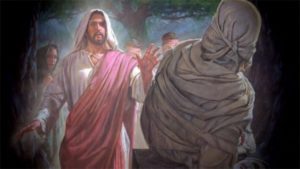 The Lord, at times, allows us to go through experiences of profound darkness, experiencing the deep mysteries of pain and sorrow so that He might make more perfectly-known His power. We see this with Jesus raising Lazarus from the dead.
The Lord, at times, allows us to go through experiences of profound darkness, experiencing the deep mysteries of pain and sorrow so that He might make more perfectly-known His power. We see this with Jesus raising Lazarus from the dead.
Truly, if the Lord had been with Lazarus, Lazarus would not have died. But God, for His sovereign purpose, did not have Jesus on the same timetable as Mary and Martha had desired. Their brother, Jesus’ friend, Lazarus, who had been sick, now died.
Jesus says some things that could be misinterpreted as being heartless. He says, “I am glad for your sakes that I was not there.” But then he explains that he was allowing this painful situation, that they might believe (John 11:15).
When Jesus tells Martha, “Your brother will rise again,” She answers according to her doctrinal understanding of eschatology. “I know he will rise again in the resurrection on the last day”, since that is what the Scriptures taught (Daniel 12:2). She said, “if you had been here in the past, my brother would not have died, he would have been healed.” She had faith for the future and the past but no faith for the present.
Jesus says, “I AM (ever and always, past, present, and future) THE RESURRECTION AND THE LIFE” (John 11:25). “He who believes in me will live even if he dies, and everyone who lives and believes in Me will never die. Do you believe this?”
This is a good question for us today! Do we believe WHO JESUS IS? Do we believe HIM for what He can do in the present, as we can believe what He has done in the past or will do in the future?
“Yes, Lord, I believe You are the Christ, the Son of God, even He who comes into the world”.
Jesus proves that He is the resurrection and the life by raising Lazarus to life.
Far from being heartless, Jesus weeps at the tomb. He sees what an enemy death is. We cannot say with certainty whether Jesus was weeping tears of sympathy, tears of grief, or tears of disappointment at their unbelief. We do know that Jesus wept because He cares.
Although Lazarus had been dead for four days, Jesus commands that the stone be removed from the tomb. Jesus reminds them that He promised that they should see the glory of God. He then raises His eyes and thanks the Father ahead of time for what He is about to do. He then calls Lazarus forth. Lazarus comes forth, bound hand and foot with wrappings.
Jesus commands the people to unbind him and let him go.
We have a part to play in the work of Jesus calling dead people to life. As they step out, many are still bound in their graveclothes, with habits befitting those who are dead to God. We need to help them by unbinding them with discipling care and releasing them to the Lord of the harvest, and letting them go!
The reading closes with the Pharisees learning of Lazarus being raised from the dead. They want to kill Jesus and Lazarus. They fear that if people come to know Jesus, their jobs would become useless!
Caiaphas unwittingly makes a prophecy:
John 11:50 50 it is expedient for you that one man dies for the people, and that the whole nation not perish.”
TODAY’S READING IN THE BOOK OF PSALMS – Psalm 117:1-2
In today’s New Testament reading, we came across the shortest verse in the Bible, that is in the English translation of John 11:35, “Jesus wept”. In today’s reading from the Old Testament Book of Psalms, we have come across the Bible’s shortest Psalm, Psalm 117. It has only two verses with a total of only 17 Hebrew words. It also has the distinction as being the middle chapter in the Bible, the 595th chapter.
It is a call to the Gentile nations. The entire world is called to worship the Messiah. It is a Messianic Psalm. It is quoted by the Apostle Paul in connection with the work of Christ in the New Testament Book of Romans Chapter 15, verse 11. Both Jew and Gentile are called to praise the Lord on the ground of a fulfilled Passover because Christ is The Passover Lamb.. Israel belongs to the nations and the nations belong to Israel because both are to belong to the Lord through the Lamb of God.
The Psalm opens and closes with the Hebrew word for praise- Hallel. Praise the Lord is Hallelujah in Hebrew. The invitation is given to the international community.
Psalm 117:1-2 1 Praise the LORD, all nations; Laud Him, all peoples! 2 For His lovingkindness is great toward us, And the truth of the LORD is everlasting. Praise the LORD!
John Phillips writes in his commentary on Psalms, “How the heart of our God yearns over lost men and women. He see the Chinese, Cubans, Vietnamese, and His heart longs over them. They are seeking to build secual paradises on earth, motivated by the vision of Karl Marx, the vision of a man without God, brainwashed to believe that God does not exist, that all things result from the blind working of evolutionary force, that man is simply a social insect caught in the web of time. The Psalmists calls to them too: O praise the Lord, all you atheist nations.
God sees Europeans and Americans seeking a solution t the problems in humanism and materialism, in pleasure-seeking and money-making, in permissiveness, in drugs and drink. He sees lands once ablaze with gospel truth now wrapped in darkness. “O praise the LORD, oh Western lands.”
The Psalmist uses another word for praise in the second part of the first verse. Laud Him!” This means to sing or praise with a voice loud enough for everyone to hear!
The second verse gives us the reason for praising the Lord loud enough to be heard far and wide. It is the good news of the gospel- His covenant mercy and truth. Salvation does not rest on sentiment. It rests on the truth of the shed blood of our Sin-bearing substitute on the mercyseat- our Savior’s finished work of redemption. The gospel truth of the Lord is everlasting.
TODAY’S READING IN THE BOOK OF PROVERBS
Proverbs 15:22-23 Without consultation, plans are frustrated, But with many counselors they succeed. 23 A man has joy in an apt answer, And how delightful is a timely word!
These proverbs remind us of the value of circumspect planning with good advice, and the value of appropriate speech.
PRAY FOR THE NATIONS-
We continue to pray for Ethiopia (from Prayercast.com)
As the oldest independent nation in Africa and one of the oldest in the world, Ethiopia has developed a rich and distinct cultural heritage. Unlike many African nations, Ethiopia has never been colonized, though Italy briefly occupied it. Known as Abyssinia until the 20th century, the nation was ruled by an age-old monarchy. Landlocked since Eritrea became independent in 1993, Ethiopia also shares borders with Somalia, Kenya, Sudan, and Djibouti in eastern Africa. Ethiopian coffee, enjoyed throughout the world, is the nation’s main export.
Agriculture has been the foundation of the Ethiopian economy for centuries, but years of over-cultivation and unreliable weather caused frequent droughts, famines, and eventually civil unrest. As a result, a Marxist junta overthrew the long-running monarchy in 1974. Many of the same problems brought an end to the junta in 1991 and led to the establishment of a democratic government. Though now considered one of Africa’s most stable nations, the previous troubled years have also left Ethiopia one of the poorest. Many of its people are starving, and two-thirds are illiterate. The government has recognized the need for economic changes, has implemented improved agricultural practices and is accepting food aid, which has helped reduce the number of those starving.
Christianity has a long history in Ethiopia. Since its introduction in the fourth century and the establishment of the Ethiopian Orthodox Church in 1270, Christianity has been a part of everyday life in Ethiopia. Persecution during the Marxist junta was severe but brought many to Christ. Evangelicals increased significantly and are still active in ministry under the current freedoms. Approximately sixty percent of Ethiopians consider themselves Christians. Frequently existing in peace among the Christians is a strong Muslim influence (34%), but some Islamic groups are threatening that fragile peace. Christian churches in Ethiopia have recognized the need to work together to strengthen believers and to find ways to minister to the poor.
PRAYER: Lord, thank You for Your Word. You counsel us with these readings from the Old and New Testaments. We pray that we will continually commune with You in Your presence and not lean on our own understanding and play the fool, like King Saul. Give us a heart that is purely devoted to You. We respect Your ways and Your timing. Prevent us from getting anxious and taking matters into our own hands. May our faith be not only anchored in Who You were and what You accomplished in the past, and what You will do in the future, but may we have faith in Who You are with us in the present moment, as ‘The Resurrection and the Life.
-Pastor David
